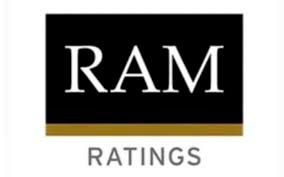PETALING JAYA: RAM Ratings said it expects the negative bias in rating actions to remain through the next few quarters, as 14 RAM-rated entities still carried a negative outlook as at end-December 2020.
“That said, we expect the overall rated credits to withstand near-term pressure because over 80% of our portfolio is anchored by financial institutions and project finance companies with strong capitalisation, robust liquidity buffers and healthy cashflows.
“In view of MCO 2.0, RAM is currently undertaking another portfolio-wide assessment which will be released soon. The preliminary results indicate limited near-term rating pressure on our portfolio,” RAM said in conjunction with the release of its latest annual Corporate Default and Rating Transition Study.
Its broader analysis of corporates in Asean-6 (Asean-5 + Vietnam) reveals that Malaysian firms have stronger debt protection metrics than their Asean peers.
Although half of the companies listed on Bursa Malaysia still reported weaker earnings in Q3’20 (-0.8% y-o-y compared to -33% in Q2’20), their debt protection metrics remained intact. For the third quarter of last year, the median gearing ratio averaged 0.22 times (Asean: 0.38 times) while debt servicing capacity – measured by the pretax earnings-to-debt ratio – averaged 0.34 times (Asean-6: 0.23 times).
The average Malaysian firm had enough cash to support 3.5 months’ operating expenses. Relative to RAM’s benchmarks and Asean peers, these metrics are not considered aggressive. Moreover, recent sample data for Q4’20 results indicate improvements in these measures for both Malaysia and Asean-6.
RAM said the path to full recovery will remain uneven and fragile in 2021, depending much on the success of the country’s vaccination programme and the global outlook. Swift execution of the inoculation regime and no further outbreaks may lend upside to Malaysia’s economic recovery and RAM’s GDP growth forecast, which currently stands at 5% for this year.
As at end-January 2021, the government had launched up to RM320 billion of fiscal stimulus packages and various financial relief measures to help households and businesses contend with the economic fallout. These, including higher allocations for big-ticket infrastructure projects, have shored up the financial markets, as have record low interest rates.
The domestic corporate bond market therefore kept up its momentum in 2020, with RM104.6 billion of gross bond/sukuk issuance – at par with the preceding year’s RM105.3 billion. The bond/sukuk pipeline spiked up in Q4’20 as companies took the opportunity to refinance or lock in cheap funding.
“Unsurprisingly, the overarching theme of rating actions was negative last year as the various lockdowns started to strain some issuers’ finances. In total (counting downgrades and outlook revisions), RAM took negative rating actions on 17 issuers (9.5% of our rated portfolio) in 2020. Of these, the ratings of six issuers were downgraded (2019: three) as opposed to four upgrades (2.2% of rated portfolio).
“At the same time, the number of issuers on negative outlook climbed up to 7.8% (2019: 0.6%). Issuers affected by negative rating actions included those from the tourism/hospitality and travel/aviation sectors, which have been hard hit by movement restrictions. Following these negative actions, the rating drift (defined as upgrades net of downgrades and defaults) ended 2020 in negative territory. There were, however, no defaults during the year,“ said RAM.









